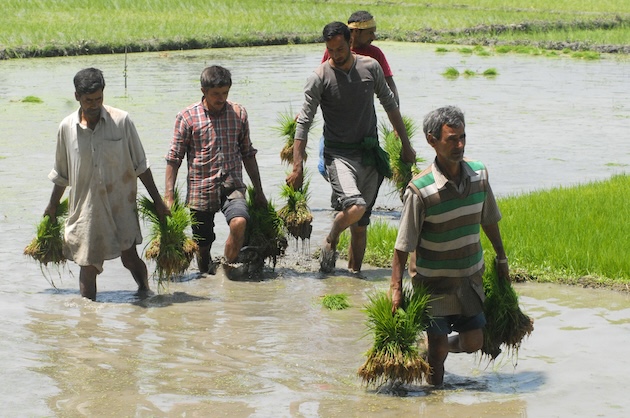
SRINAGAR, Jul 15 (IPS) – Political parties often pay lip service to climate change, but farmers in India, faced with unpopular policies and uncertain livelihoods due to climate change, made sure their views were heard during the recent general elections. On June 4, Ram Das, a 65-year-old farmer from the northern Indian state of Haryana, anxiously awaited the results of the country’s general elections. It was early morning when he left his home and gathered with his fellow villagers at a tea stall with a transistor radio playing the election results.
By 11 a.m., Das had already had three cups of tea and smoked a few cigarettes. His fears were eased as the results showed a dwindling number of seats for India’s ruling Bharatiya Janata Party (BJP). He, like the entire hamlet, had voted against the Narendra Modi government. “The farmers are not happy at all. We wanted to teach this government a lesson, and that’s what we did,” Das told the Inter Press Service.
Despite securing a third term in the government, the BJP’s overall electoral performance was described as a “shock” for Prime Minister Narendra Modi by several media sources. The party fell short of its target of winning 400 out of 543 seats, managing to bag just 240 seats compared to 303 in the last elections held in 2019. Opposition parties made significant gains in states with large agrarian populations such as Uttar Pradesh, Haryana, Maharashtra, Punjab and West Bengal. As a result, the BJP had to rely on the 28 cumulative seats of its allies to form the government.

What went wrong and where?
When Narendra Modi first took office in 2014, he promised to reform the agriculture sector and double farmers’ incomes. However, government data from 2022 shows that farmers still live in squalid conditions, earning as little as Rs 28 ($0.34) a day.
Government data shows that between 2018 and 2022, as many as 53,478 farmers committed suicide, overwhelmed by mounting debts, inadequate compensation for their produce and unpredictable weather conditions. This means that 36 farmers committed suicide every day during this period. “The numbers could be much higher than what the government data predicts. This could be the tip of the iceberg. Many farmer suicides go unreported and never make it into government records,” says Abinav Sinha, a civil society activist from the Indian state of Uttar Pradesh.
In 2020, the Modi government introduced three controversial farm laws without consulting farmer groups. The move sparked a massive, year-long protest as farmers feared the laws would lead to greater corporatization of agriculture and the removal of state-backed protections such as the minimum support price and procurement of farm produce by state agencies.
The government eventually repealed the controversial farm laws, but not before taking a tough stance on the protests. Authorities arrested farmers, barricaded highways to prevent them from reaching New Delhi, and used guns, bullets, and drones to fire tear gas at unarmed protesters. According to various farmers’ associations, more than 570 farmers were killed during the protest.
In February this year, farmers took to the streets again, this time to demand legal guarantees for a minimum support price (MSP) for crops, among other issues. However, negotiations with government officials failed to yield any conclusive results.
This prompted farmer organisations across the country to convert their efforts into political action and unanimously decided to vote against the ruling Bharatiya Janata Party (BJP).
June 4: The D-Day
Farmers like Das from Haryana were among thousands of other farmers who did not even allow BJP candidates to enter their villages for campaigning. “They were ruthless with us when we wanted to roll back the draconian farm laws. How on earth are we supposed to vote for them? We will not even allow them to campaign here,” Das said.
On June 4 this year, the election results were announced and the country was shocked to see that states with a significant agricultural population voted against the BJP.
In Rajasthan, where the BJP secured victory in the state government in December last year, the party won 14 of the 25 seats in the recent elections, a sharp drop from winning all 25 seats in 2019.
In Uttar Pradesh, a state where 65 percent of the population depends on agriculture, the BJP managed to win just 33 of the 80 seats, a sharp drop from the 62 seats it won in 2019 and 71 in 2014.
In Haryana, known as the breadbasket of India, the BJP’s number of seats fell to five out of ten available seats. In 2019, the BJP won all ten seats. The opposition Congress claimed the remaining five seats.
In Punjab, a major producer of rice and wheat, the BJP failed to win a single seat, leaving the rest of the state without seats.
The government cannot ignore climate change now
Pranav Shankar, a climate activist based in New Delhi, told IPS that this year’s general elections in India have revealed a significant trend that cannot be ignored, trivialized or undermined. “The farmers have spoken out. This is the reality. Till now, the government has ignored the importance of the farming community. From now on, the government must remain diligent towards the needs of farmers and take measures to tackle climate change that is ravaging the country and leaving farmers in distress,” Shankar said.
He added that more than 33 election officials were killed by heat stroke during the national elections in India this year. “Nobody spoke about them. Even the government itself seems to have forgotten those poor souls. This is all very unprecedented,” Shankar said.
Please note: This feature is published with the support of the Open Society Foundations.
IPS UN Office Report
Follow @IPSNewsUNBureau
Follow IPS News UN Bureau on Instagram
© Inter Press Service (2024) — All rights reservedOriginal source: Inter Press Service







